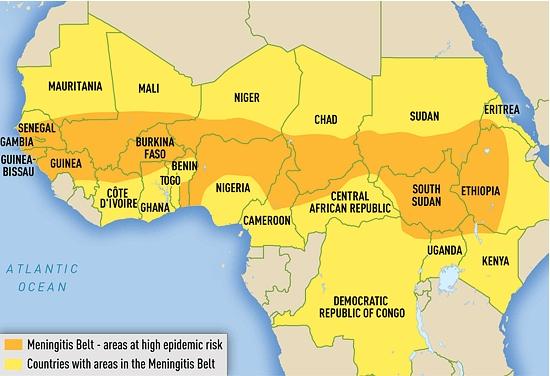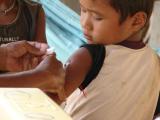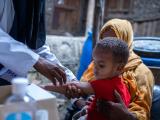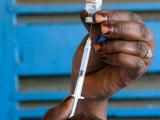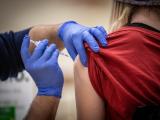Representatives from 26 countries in Africa's "meningitis belt" met yesterday in Addis Ababa, Ethiopia, to celebrate the fact that vaccination campaigns have nearly eliminated serogroup A meningitis cases on the continent, according to a World Health Organization (WHO) press release.
And a related report from the WHO Regional Office for Africa and the Eastern Mediterranean Region yesterday details childhood immunization successes and setbacks over the past 15 years on the African continent.
Meningitis vaccine success
The Meningitis Vaccine Project (MVP) Closure Conference yesterday addressed developments since MVP was formed in 2001 to lead the development of a meningitis A vaccine specifically for use in Africa's meningitis belt, which stretches from West Africa across the continent to Ethiopia (see image above). Since 2008, the GAVI Alliance has distributed $367 million to fund mass vaccination programs in high-risk countries.
The meningitis A vaccine MenAfriVac, manufactured by the Serum Institute of India Private Ltd., was introduced in Burkina Faso in 2010. Since then, 16 countries have conducted mass MenAfriVac vaccination campaigns, resulting in the immunization of more than 235 million children and young adults.
The remaining 10 meningitis belt countries plan to hold mass immunization activities nationwide or in high-risk areas in the next 2 years. Meningitis cases in Africa have decreased from more than 250,000 during a 1996 outbreak to 80 cases in 2015, a decline attributed to mass vaccination campaigns in meningitis belt countries, the WHO said.
Unlike previous meningitis A vaccines, MenAfriVac protects young children, offers long-term protection, and can be used before an epidemic begins. The vaccine costs less than $0.50 per dose, does not require constant refrigeration, and offers some protection against tetanus.
Meningitis vaccination coverage needs to be sustained, or countries could see meningitis A epidemics begin again within 15 years, the WHO said. "To sustain the protection that has been afforded to date against meningitis A, all at-risk countries must finish conducting vaccination campaigns and begin incorporating the vaccine into routine childhood immunization programs," said Matshidiso Moeti, MB, MSc, WHO regional director for Africa.
The GAVI Alliance is allocating financial support for integration of MenAfriVac into routine childhood immunization programs, the WHO said. Eight countries have already applied for funding, and the remaining 18 meningitis belt nations are expected to apply within the next several years.
Though the reductions in meningitis A cases along the meningitis belt are promising, African countries still report cases and epidemics related to other meningitis serogroups, most prominently meningitis W and C, the WHO said. In response to this need and to insufficient vaccine supplies to target these serogroups, MenAfriVac's manufacturer is beginning clinical trials on a pentavalent meningitis vaccine that will target serogroups A, C, W, X, and Y.
Childhood vaccine successes, challenges
In a separate news release related to the Addis Ababa meeting, the WHO's African office noted that, although the continent has seen some successes with childhood vaccines, one in five children on the continent still do not receive life-saving immunizations. Moeti called that rate "unacceptable."
Successes consist of an increase in diphtheria-tetanus-pertussis (DTP3) vaccine coverage from 57% in 2000 to 80% in 2014, an 86% decrease in measles deaths between 2000 and 2014, and the introduction of pneumococcal conjugate and rotavirus vaccines, the agency said.
Setbacks include low rates of second-dose coverage for measles-containing vaccine (19%); poor coverage of DTP3 vaccine in children (one in five are not immunized); and widespread cases of measles, rubella, and neonatal tetanus.
The WHO attributes many of the setbacks to fragile health systems and national crises, calling for long-term domestic commitment to childhood immunization programs. It published a full report on immunization in Africa.
In a WHO related commentary this week, Moeti and Ala Alwan, MD, WHO regional director for the Eastern Mediterranean, wrote, "Africa has an incredible opportunity to provide a better life for each and every child—and we know exactly how to seize it: provide universal access to immunization across the continent to protect them from vaccine preventable diseases."
See also:
Feb 23 WHO meningitis press release
Feb 23 WHO childhood immunization press release
Feb 23 WHO immunization report
Feb 22 WHO commentary by Moeti and Alwan
